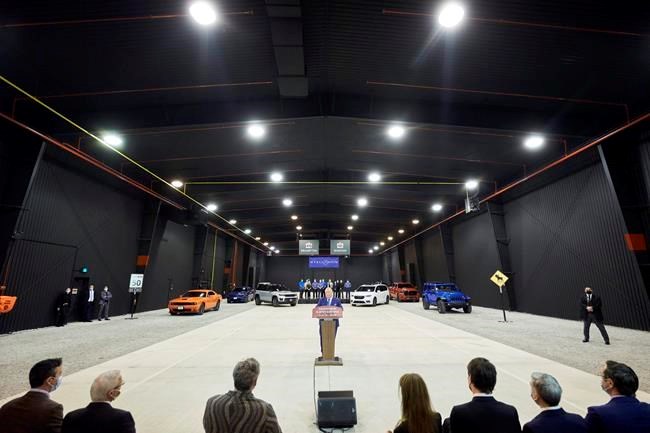Ontario is offering more money in a bid to keep automaker Stellantis from pulling out of building an electric-vehicle battery plant in Windsor, Ont., Premier Doug Ford said Friday.
Stellantis and LG Energy Solution announced last year that they were building the $5-billion plant, but have in recent days stopped construction and warned they were implementing contingency plans because the federal government hasn't lived up to an agreement to match subsidies on offer in the United States.
Following Ford's comments, federal Industry Minister François-Philippe Champagne said "we're making progress" on finalizing the deal and getting things back on track.
Champagne said he had a two-hour dinner with the president of LG Energy Solutions, Kwon Young Soo, during a visit to Seoul this week, and said it was a productive meeting. Champagne said Kwon wrote back to him Friday morning.
"I think we have a common understanding on the way forward," Champagne said from Washington, D.C., where he was attending meetings.
The original deal with Stellantis and LG, signed in March 2022, would have seen Ontario and Canada contribute $500 million each toward the capital costs of the new battery plant.
But the companies went back to Canada in August after the United States signed the Inflation Reduction Act into law, which offers companies production tax credits of up to $35 per kilowatt hour in each battery produced.
Kwon and Stellantis CEO Carlos Tavares wrote last month to Prime Minister Justin Trudeau, saying Ottawa had confirmed in writing five times that it would match production incentives under the United States' Inflation Reduction Act, but has not delivered on those commitments.
A "special contribution agreement" was reached in February, but the federal government has been pressuring Ontario to pitch in more money as well, saying the province also has to pay its "fair share."
Champagne did not bite when asked if Ontario's offer is now what Canada would consider the province's "fair share."
Ford said earlier this week he was disappointed with how the federal government has handled the issue, since the province didn't make those production subsidy commitments, but said he was working with officials in Ottawa.
"I will confirm we're putting more money on the table," he said after an unrelated announcement in St. Catharines, Ont.
"This is all about saving jobs and giving people the quality of life they deserve in southwestern Ontario."
The Stellantis battery plant would supply its car manufacturing factories in North America and employ about 2,500 people. Auto parts makers expect the plant to create about 10,000 indirect jobs.
Stellantis and LG sent the letter to Trudeau around the same time the terms of the Volkswagen deal were made public, but Champagne said Friday there was no correlation. He said the Stellantis and Volkswagen deals were being negotiated in parallel.
Ontario also committed $500 million in capital as part of the latter deal, but Canada's offer included $700 million in capital and between $8 billion and $13 billion in production subsidies over a decade to match the IRA. There is a provision that reduces or eliminates those subsidies if the IRA is adjusted or cancelled.
Ontario did not contribute to the production subsidies for Volkswagen, but Canada is looking for the province to do so for Stellantis. Champagne dodged a question about why that is, but said Ontario stands to benefit the most from the plant.
"A lot of the benefits will be for workers in Ontario, for the auto industry in Ontario," he said.
Federal officials said earlier this week that Ontario did provide more than the $500 million capital for Volkswagen, pointing to what Ford has described as "hundreds of millions" of dollars Ontario invested in infrastructure to support the Volkswagen plant, including for roads, highways and electricity connections.
Finance Minister Chrystia Freeland said Wednesday that MPs from other provinces and other provincial governments have been asking what their provinces are going to get as they watch Ottawa pour billions into auto deals in Ontario.
She said provinces that benefit from the federal government's $120-billion-plus green industrial strategy should "pay their share."
This report by The Canadian Press was first published May 19, 2023.
Allison Jones and Mia Rabson, The Canadian Press

